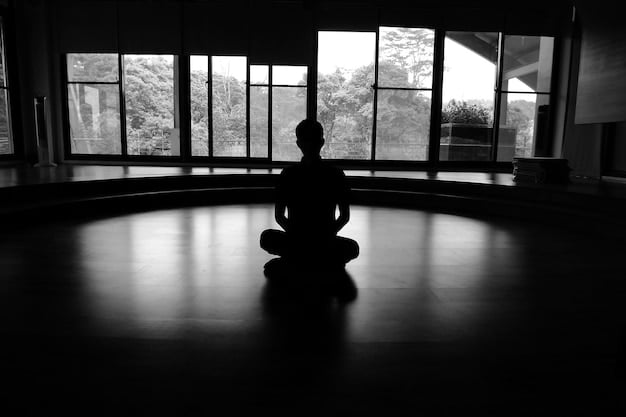Zen Meditation Benefits: A Guide to Zazen Practice

Discover the Benefits of Zen Meditation: A Comprehensive Guide to Zazen Practice explores the profound path of Zazen, unraveling its techniques, benefits, and accessibility in modern life.
Embark on a journey of self-discovery and tranquility as we discover the benefits of Zen Meditation: A Comprehensive Guide to Zazen Practice, an ancient technique for cultivating mindfulness and inner peace in the modern world.
Understanding Zen Meditation: The Essence of Zazen
Zen Meditation, often referred to as Zazen, is a foundational practice in Zen Buddhism. It involves seated meditation, traditionally performed to gain insight into the nature of existence. The core of Zazen lies in observing thoughts without judgment, leading to a state of mental clarity and equanimity.
The beauty of Zazen is its simplicity and accessibility. It requires no special equipment or environment, making it adaptable to various lifestyles and settings. Through consistent practice, individuals can unlock a deeper understanding of themselves and their place in the world.

The Principles Behind Zazen
- Mindfulness: Cultivating awareness of the present moment without getting carried away by thoughts or emotions.
- Posture: Maintaining a stable and erect posture to promote alertness and ease.
- Breath Awareness: Focusing on the natural rhythm of the breath as an anchor to the present moment.
Zazen isn’t about emptying the mind; it’s about observing the contents of the mind with compassion and curiosity. It’s a practice that fosters acceptance and non-attachment, allowing practitioners to navigate life’s challenges with greater ease and resilience.
In essence, Zazen is a pathway to self-discovery and inner peace, providing a framework for cultivating mindfulness and wisdom in everyday life. By understanding its principles and embracing its practice, individuals can unlock a profound sense of well-being and connectedness.
The Physical Benefits of Zazen Practice
Engaging in Zazen practice offers a range of physical benefits that extend beyond mere relaxation. Studies have shown that regular Zen Meditation can have a profound impact on physical health, contributing to overall well-being.
From reducing stress to improving sleep quality, the physical benefits of Zazen are multifaceted and far-reaching. By incorporating this practice into daily life, individuals can experience tangible improvements in their physical health and vitality.
How Zazen Impacts Physical Health
Zazen meditation activates the parasympathetic nervous system, which is responsible for the “rest and digest” response. This activation leads to decreased heart rate, lower blood pressure, and reduced levels of stress hormones like cortisol. Over time, this can significantly reduce the risk of cardiovascular diseases.
- Stress Reduction: Lowering cortisol levels and promoting relaxation.
- Improved Sleep: Facilitating deeper and more restorative sleep.
- Pain Management: Reducing the perception of chronic pain.
Consistent Zazen practice enhances body awareness, allowing individuals to identify and address physical discomfort more effectively. It also promotes better posture and alignment, reducing strain on muscles and joints.
By integrating Zazen into a wellness routine, individuals can experience a holistic approach to health, addressing both the physical and mental aspects of well-being. The practice serves as a powerful tool for enhancing resilience and promoting a sense of vitality and balance.
Mental and Emotional Well-being Through Zen Meditation
Zen Meditation extends its benefits far beyond the physical realm, deeply impacting mental and emotional well-being. It serves as a powerful tool for cultivating emotional resilience, fostering self-awareness, and promoting overall mental clarity.
Through regular practice, individuals can learn to navigate challenging emotions with greater ease and compassion, developing a stronger sense of inner peace and stability. Zazen offers a sanctuary for the mind, fostering an environment where mental and emotional healing can occur.
The Psychological Advantages of Zazen
Zazen meditation encourages non-judgmental self-observation, allowing individuals to become more aware of their thought patterns and emotional responses. This increased self-awareness is the first step towards breaking free from negative thought cycles and fostering healthier coping mechanisms.

It helps to cultivate a sense of detachment from thoughts and feelings, recognizing them as transient experiences rather than fixed realities. This can lead to a greater sense of emotional freedom and resilience in the face of adversity.
- Anxiety Reduction: Calming the mind and reducing feelings of worry.
- Improved Focus: Enhancing concentration and attention span.
- Emotional Regulation: Cultivating a balanced and compassionate approach to emotions.
Regular Zen Meditation has been shown to increase gray matter in the brain regions associated with learning, memory, and emotional regulation. This suggests that consistent practice can lead to long-term improvements in cognitive function and emotional intelligence.
By embracing Zen Meditation as a daily practice, individuals can unlock a wealth of mental and emotional benefits, fostering greater self-awareness, emotional resilience, and overall psychological well-being. It serves as a pathway to inner peace and a more balanced and fulfilling life.
How to Get Started with Zazen: A Step-by-Step Guide
Beginning a Zazen practice is simple and accessible, requiring only a quiet space and a willingness to commit to regular practice. This step-by-step guide provides the essential elements for establishing a successful Zazen routine.
From posture to breath awareness, each component is designed to facilitate a deep and transformative meditation experience. By following these guidelines and embracing patience, individuals can embark on a journey of self-discovery and inner peace.
Essential Elements of Zazen Practice
- Find a Quiet Space: Choose a location free from distractions where you can sit undisturbed.
- Assume the Correct Posture: Sit on a cushion or chair with a straight but relaxed spine. The lotus or half-lotus position is traditional but not required.
- Focus on Your Breath: Count each breath, or simply observe the sensation of the breath entering and leaving your body.
During Zazen, thoughts will inevitably arise. The key is not to suppress them but to acknowledge them without judgment and gently redirect your attention back to your breath. This process of observation and redirection is central to the practice.
Start with short sessions of 10-15 minutes and gradually increase the duration as you become more comfortable. Consistency is key, so aim to practice at the same time each day to establish a routine.
By following this step-by-step guide and approaching Zazen with patience and openness, individuals can establish a sustainable practice that fosters self-awareness, inner peace, and overall well-being.
Incorporating Zazen into Daily Life: Practical Tips
While formal Zazen practice is beneficial, its principles can be extended into daily life, integrating mindfulness into everyday activities. This integration allows individuals to cultivate a greater sense of presence and awareness in all aspects of their lives.
From mindful eating to mindful walking, there are numerous ways to incorporate the essence of Zen Meditation into daily routines. By embracing these practices, individuals can transform ordinary moments into opportunities for self-discovery and inner peace.
Mindfulness in Everyday Activities
- Mindful Eating: Paying close attention to the taste, texture, and aroma of each bite.
- Mindful Walking: Focusing on the sensation of your feet making contact with the ground.
- Mindful Listening: Fully engaging in conversations without interrupting or formulating responses.
Integrating mindfulness into daily activities can reduce stress, improve focus, and enhance overall well-being. It also fosters a greater appreciation for the present moment and a deeper connection to oneself and others.
By practicing mindfulness in daily life, individuals can cultivate a sense of inner peace and resilience that extends beyond formal meditation sessions. This integration transforms everyday moments into opportunities for growth and self-discovery.
In conclusion, Zazen should be viewed not just as a formal meditation practice, but as a lifestyle. It is a way of being present and bringing mindfulness to every moment.
Common Challenges and How to Overcome Them in Zazen
Like any practice, Zazen meditation can present challenges, especially for beginners. It’s common to experience restlessness, wandering thoughts, and physical discomfort during meditation sessions. However, with patience and perseverance, these challenges can be overcome.
By understanding the nature of these obstacles and implementing effective strategies, individuals can deepen their Zazen practice and unlock its full potential. This section offers guidance on navigating common challenges and fostering a more sustainable and rewarding meditation experience.
Addressing Common Obstacles in Zazen
- Restlessness: Acknowledge the feeling without judgment and gently redirect your attention back to your breath.
- Wandering Thoughts: Observe your thoughts as they arise and pass, without getting carried away by them.
- Physical Discomfort: Adjust your posture to find a more comfortable position without compromising your spine.
It’s important to remember that challenges are a natural part of the meditation process. They offer opportunities for growth and self-discovery, fostering greater self-awareness and resilience.
By approaching these challenges with patience, compassion, and a willingness to learn, individuals can deepen their Zazen practice and unlock its transformative power. It’s a journey of self-discovery that requires commitment and perseverance, but the rewards are immeasurable.
Consistency is key. Even if you only meditate for a few minutes each day, the cumulative effect can be profound. Remember to be kind to yourself and celebrate your progress along the way.
| Key Point | Brief Description |
|---|---|
| 🧘♀️ Zazen’s Essence | Mindfulness through seated meditation, observing thoughts without judgment. |
| 💪 Physical Benefits | Reduces stress, improves sleep, manages pain by activating the parasympathetic nervous system. |
| 🧠 Mental Well-being | Fosters emotional resilience and self-awareness through non-judgmental self-observation. |
| 🌱 Starting Practice | Find a quiet place, assume correct posture, and focus on breath with patience and consistency. |
Frequently Asked Questions (FAQ)
▼
The primary goal is to cultivate mindfulness and gain insight into the nature of existence by observing thoughts without judgment. It fosters mental clarity and emotional equanimity.
▼
Consistency is key. Daily practice, even for short sessions of 10-15 minutes, is ideal. Gradually increase the duration as you become more comfortable with the practice.
▼
Sit with a straight but relaxed spine on a cushion or chair. The lotus or half-lotus position is traditional but not required. Ensure you are comfortable and can maintain the posture without strain.
▼
Acknowledge your thoughts without judgment and gently redirect your attention back to your breath. This process of observation and redirection is central to the practice.
▼
Yes, regular Zazen practice activates the parasympathetic nervous system, reducing cortisol levels and promoting relaxation, which can significantly alleviate anxiety and stress.
Conclusion
In conclusion, discovering the benefits of Zen Meditation: A Comprehensive Guide to Zazen Practice reveals a pathway to profound well-being. By understanding the techniques, embracing consistent practice, and integrating mindfulness into daily life, individuals can unlock a deeper sense of self-awareness, emotional resilience, and inner peace, ultimately enriching their lives in countless ways.





